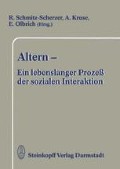Zusammenfassung
Die Lösung der Frage nach der primären Rolle von Person oder Situation in der Auslösung und Steuerung menschlichen Verhaltens im Sinne einer „interaktionisti-schen“ Persönlichkeitspsychologie (22, 27) scheint viele Fachgenossen nicht mehr zufriedenzustellen. Biologisch orientierte Kollegen schlagen z.B. vor, das Phänomen „coping“ unter Einbeziehung des Konstrukts der „Erbkoordination“ neu zu konzeptualisieren (4). Andere meinen, Persönlichkeitsforschung werde etwas davon gewinnen, wenn man sie von der Betrachtung der biologischen Funktion interinindivueller Differenzen aus betreibe (1). Für wieder andere zählt die Qualität der Lebenssituation für das Wohlbefinden im Alter wenig, nur Persönlichkeitsvariablen seien entscheidend: Personality, it appears, is a life long determinant of subjective well-being (10).
Access this chapter
Tax calculation will be finalised at checkout
Purchases are for personal use only
Preview
Unable to display preview. Download preview PDF.
Literatur
Ahrens HJ, Ameland M (1989) Biologische Funktionen individueller Differenzierung. Verlag fur Psychologie, Göttingen
Baltes PB, Baltes MM (1980) Plasticity and variability in psychological aging. In: Gurski GE (eds) Determining the effects of aging on the central nervous system. Springer, Berlin Heidelberg New York, pp 41–66
Baltes PB, Baltes MM (1989) Optimierung durch Selektion und Kompensation. Z Pädagogik 35:85–105
Bischof N (1989) Emotionale Verwirkungen. Oder von den Schwierigkeiten im Umgang mit der Biologic Psychol Rdschau 40:188–205
Block J (1972) Lives through the years. University of California Press, Berkeley
Block J (1977) Advancing the psychology of personality. In: Magnusson D, Endler NS (eds) Personality at the cross-roads. Lawrence Erlbaum, Hilldale, NJ, pp 37–64
Brandt U (1964) Fluchtlingskinder. Eine Untersuchung zu ihrer psychischen Situation. JA Barth, Miinchen
Buhler C (1933) Der menschliche Lebenslauf als psychologisches Problem. Hirzel, Leipzig
Coerper C, Hagen W, Thomae H (Hrsg) Deutsche Nachkriegskinder. Thieme, Stuttgart
Costa PT, McCrae RR (1984) Personality as a life-long determinant of well-being. In: Malatesta CZ, Izars CE (eds) Emotion in adult development. Sage, Beverly Hills, pp 141–157
Elder GH (1974) Children of the great depression. University of Chicago Press, Chicago, 111
Elder GH, Caspi A, Downey G (1986) Problem behavior and family relationship. Life course and intergenerational themes. In: Soerensen AB, Weinert FE, Sherrod LR (eds) Human development and the life course. Erlbaum, Hillsdale NJ, pp 293–340
Elder GH, Caspi A (1990) Studying lives in a changing society. In: Rabin AI, Zucker RA, Frank F, Emmons R (eds) Study in persons and lives. Springer, Berlin Heidelberg New York (in press)
Engels H, Thomae H (1950) Schuld und Siihne im Urteil jugendlicher Arbeiter der Gegenwart. Unsere Jugend 2
Erikson HE (1950) Growth and crises of the healthy personality. In: Senn M (ed) Symposium on the healthy personality. J Macey Foundation, New York
Erikson HE (1968) Identity, youth and crisis. Norton, New York
Ernst C (1988) Are early childhood experiences overrated? A re-assessment of maternal deprivation. Eur Arch Psychiatry Neurology 233:80–90
Ernst C, Luckner NV (1985) Stellt die Frühkindheit die Weichen? Enke, Stuttgart
Haan N (1977) Coping and defending. Academic Press, New York
Jones HE (1958) Problems of method in longitudinal research. Vita humana 1:93–99
Kelchner M (1929) Schuld und Siihne. J A Barth, Leipzig
Lantermann ED (1980) Interaktionen. Person, Situation und Handlung. Urban & Schwarzen-berg, München
Lehr U, Thomae H (1965) Konflikt, seelische Belastung und Lebensalter. Westdeutscher Verlag, Opladen
Lerner K (1985) The nature of human plasticity. Academic Press, New York
Levinson DJ (1978) The seasons of man’s life. Ballantine Books, New York
Maas HS (1963) Longterm effects of early childhood separation and child care. Vita humana 6:34–56
Magnusson D, Endler NS (1977) (eds) Personality at the cross-roads. Erlbaum, Hillsdale, NJ
Pervin L (1985) Personality: current controversies, issues, and directions. Ann Rev Psychol 36:83–114
Schicht U (1986) Stellungnahmen Jugendlicher zur Rechtsordnung. Unveröffentl psychol Di-plomarbeit, Universität Bonn
Stern W (1923) Die menschliche Persönlichkeit. J A Barth, Leipzig
Theobald B (1988) Bewältigungsstrategien bei traumatischer Querschnittlähmung. Unveröffentl psychol Diplomarbeit, Universität Bonn
Thomae H (1988) Das Individuum und seine Welt, 2. neubearb Aufl. Verlag für Psychologie, Göttingen
Thomae H (1989) Beiträge zur „inneren Geschichte“ der letzten 50 Jahre. Psychologie und Ge-schichte 1
Thomae H, Lehr U (1986) Stages, crises, conflicts, and life-span development. In: Soerensen AB, Weinert FE, Sherrod L (eds) Human development and the life course. Erlbaum, Hillsdale NJ, pp 429–444
Author information
Authors and Affiliations
Editor information
Editors and Affiliations
Rights and permissions
Copyright information
© 1990 Dr. Dietrich SteinkopffVerlag, GmbH & Co. KG, Darmstadt
About this paper
Cite this paper
Thomae, H. (1990). Entwicklung und Plastizität der Person. In: Schmitz-Scherzer, R., Kruse, A., Olbrich, E. (eds) Altern — Ein lebenslanger Prozeß der sozialen Interaktion. Steinkopff. https://doi.org/10.1007/978-3-642-72448-0_15
Download citation
DOI: https://doi.org/10.1007/978-3-642-72448-0_15
Publisher Name: Steinkopff
Print ISBN: 978-3-642-72449-7
Online ISBN: 978-3-642-72448-0
eBook Packages: Springer Book Archive

